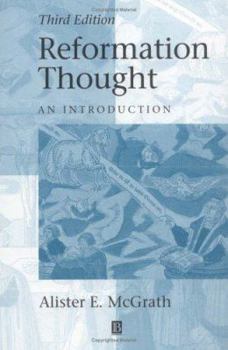Reformation Thought
Select Format
Select Condition 
Book Overview
The updated new edition of the classic textbook, providing a comprehensive, up-to-date, and accessible introduction to Reformation thought Reformation Thought is a clear, engaging, and highly... This description may be from another edition of this product.
Format:Paperback
Language:English
ISBN:0631215212
ISBN13:9780631215219
Release Date:February 2001
Publisher:Wiley-Blackwell
Length:344 Pages
Weight:1.30 lbs.
Dimensions:1.0" x 6.4" x 8.7"
Customer Reviews
5 ratings
Just as PROMISED
Published by Thriftbooks.com User , 14 years ago
It is a delight to purchase books and know that the quality specified about the condition is true to a T! Book arrived in time promised and was just what I needed for a fraction of the cost!
Thoughtful and readable
Published by Thriftbooks.com User , 14 years ago
McGrath's main theme is the centrality of *theology* in understanding the Reformation. Economics, politics and social conditions all had their part to play, but first and foremost it represented a shift in *thinking*. This is a thoughtful, readable work from a first-rate academic.
Reformation Theology: Comprehensive
Published by Thriftbooks.com User , 19 years ago
'Reformation Thought' is a comprehensive discussion of the issues at stake in the Protestant and Catholic Reformations. Alister McGrath has an amazing grasp of the issues and honestly portrays in a fair way the differing viewpoints from an unbiased, historical perspective. My favorite sections dealth with justification by faith and the return to scripture, which I summarize here... Prior to the Reformation, Scholasticism had dominated. Scholasticism was a movement that began in the Middle Ages which sought to find a systematic and rational justification to the Christian faith. Most of it was a systematic replay of Augustinian teachings organized by Aristotle's philosophies. There are two main subdivisions of scholasticism, which can be associated with two time periods. The first part of the scholastic period was dominated by realism, while the later part by nominalism. Realism said that universals were entities of themselves, while nominalism said that universal concepts are not real. Proponents of Realism included Thomas Aquinas and Duns Scotus. There were two forms of Nominalism: the via moderna and the schola Augustiniana moderna. The common feature was only that they were both anti-realism. The two schools reflect the debate between Pelagianism and Augustianism, over the ability of humans to merit salvation. The via moderna tended toward the positions of Pelagius and the schola Augustiniana towards that of Augustine. The theology of the via moderna was dominated by a covenant between God and humans in which humans, when people followed their conscience and "did their best" they could somehow obligate God to accepting them based on the terms of the covenant. Human works were of little inherent value. But God had promised, through the covenant, to treat them as if they were of much greater value. The theology of the schola Augustiniana reflected the views of Augustine that humans are totally depraved. Salvation is totally the work of God, from the beginning to its end. This view may have influenced Calvin. While it appears that Martin Luther's new theology seems to stand at the end of a long tradition of Augustinian teachings, they were different. It does not appear that Luther was ever directly influenced by the schola Augustiniana, but was reacting to via moderna. Prior to the Reformation, the concepts of justification and grace were very vague. There had been no authoritative pronouncement from the church for over a thousand years. The rise of humanism raised the question, "What must I, as an individual, do to be saved?" Luther initially studied and followed the via moderna, which was the philosophy that God was obliged to justify anyone who humbles themselves before God and does what lies within them (quod is se est). Luther realized that he was not capable of meeting the preconditions for justification. Luther "re-discovered" Augustine's doctrine of total depravity, the belief that humans are incapable of saving themselv
Doctrinal Depth and Yet Readable Narrative
Published by Thriftbooks.com User , 24 years ago
McGrath writes well. His ability to communicate, along with his mastery of the historical theology of this time period, yield an informative and substantive work that is enjoyable to read. His survey is broad and yet covers many important details lost in other surveys. The title is accurate in that the work focuses on the intellectual and theological thought that influenced the period. Well indexed, this work might also be useful also as a reference.
Polished Prose. Superior Scholarship.
Published by Thriftbooks.com User , 25 years ago
This is an extremely enjoyable book to read. The author knows his Reformation and was able to transmit this knowledge to his readers with a clear and easy to read prose. The Reformation is first placed within the socio-religious- intellectual context of the Late Middle Ages and Humanism, and then developed through its key doctrines. We learn about the reformed doctrines of justification by faith, predestination, the sacraments and the church. Special attention is paid to Luther's, Calvin's and Zwingli's own respective thoughts on each doctrine. The books closes with a lucid analysis of the impact of the Reformation upon History, with a special focus on the Protestant work ethic and the origins of capitalism - so dear to American readers. In summary: great book, highly recommended. I highlighted in yellow some key passages on my own copy and intend to revisit it periodically - it is worth it!




